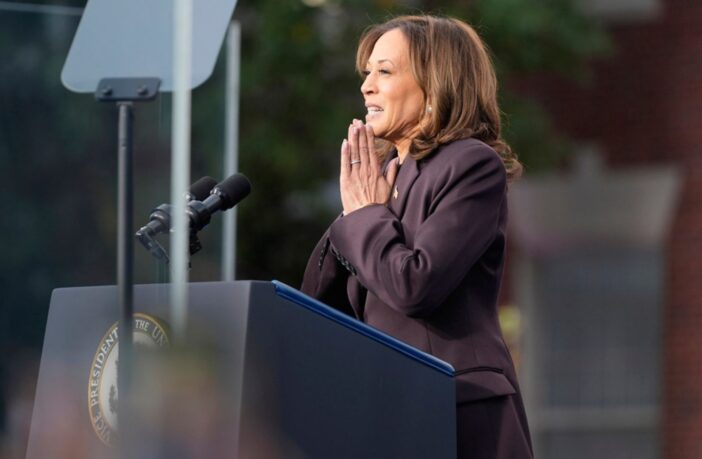The lying and misinformation about why Americans didn’t vote for Kamala Harris needs to stop.
By Keith Boykin
“Black Vote, Black Power,” a collaboration between Keith Boykin and Word In Black,
examines the issues, the candidates, and what’s at stake for Black America in the 2024 presidential election.
The Monday morning quarterbacks have spoken. Here are five bad takes on the 2024 election.
Vice President Kamala Harris delivers a concession speech for the 2024 presidential election on the campus of Howard University in Washington, Nov. 6, 2024. (AP Photo/Pablo Martinez Monsivais)
1. Kamala Harris Ran a Bad Campaign
Nah. We’re still crunching the numbers, but the latest estimate shows Harris will end up with about 76 million votes. That’s more votes than Obama got in either of his two elections. More votes than Hillary Clinton got in 2016. And more votes than Trump got in 2016 or 2020.
Understandably, we’re judging her based on Joe Biden’s extraordinary turnout of 81 million votes in 2020, but those numbers shattered all existing records because it was a referendum on Trump’s failed presidency after four years of crisis, controversy, COVID-19, and economic collapse.
As for the Electoral College, Trump will end up with 312 electoral votes this year, about the same as Biden in 2020, who got 306.
But let’s not forget what Harris accomplished here. In only 107 days, she set up her own campaign operation, locked down the delegates for the nomination, picked a running mate, staged a successful convention, beat Trump in the debate, raised $1 billion, rolled out her policy positions, crisscrossed the country, picked up major endorsements, generated more enthusiasm than any Democratic nominee since Barack Obama in 2008, and will end up with 2 million more votes than Trump got when he ran as an incumbent president four years ago.
In fact, in the swing states of Wisconsin and North Carolina, Harris got more votes than Biden did four years ago. And in Michigan and Georgia, she got more votes than Trump got in 2020. Her numbers should have been enough to win in an ordinary election. What she may not have anticipated, and perhaps should have in America, is that a racist, twice-impeached, convicted felon would get more votes in 2024 than when he lost in 2020.
Did Harris run a perfect campaign? No. But to do what she did in just over three months, while taking on the burden of the Biden administration’s handling of Gaza and inflation, is nothing short of astounding.
2. Democrats Should Have Held an Open Primary
First of all, there was no closed primary. As commentator Reecie Colbert noted, any Democrat could have run when Biden dropped out of the race in July, but nobody wanted to step up because they knew it was a tough political environment for the incumbent party.
Who is this imaginary Democratic candidate who would have jumped in the race in July, leapfrogged over the sitting vice president without causing a fracture, united the party, navigated the Gaza issue, separated from Biden’s policies on inflation, overcome Trump’s advantage with racism and bigotry, and led us all to victory? I’ll wait.
3. Identity Politics Failed
Wrong again. Kamala Harris made a conscious decision not to emphasize her race or gender and barely spoke about either one. It was Trump who talked about her turning Black, lied about Haitian immigrants eating dogs and cats, and held a racist hate rally at Madison Square Garden two weeks before the election.
As Eddie Glaude noted, Trumpism is identity politics, and that worked for him. White identity politics helped him turn out millions of angry Americans to vote. But when White people lean into their identity, as they have for the past six decades by voting exclusively for Republican presidential candidates, they don’t call it identity politics. They just call it politics.
4. It Was All About the Economy
Not exactly. As I explained in a previous post, Kamala Harris’s proposals were more popular than Trump’s. Trump had no plan to fix inflation. His proposed tariffs would make inflation worse. His rambling speeches and alarming campaign ads focused on scaring voters about transgender issues and illegal immigration, not on fixing the economy. And Black voters, who are disproportionately impacted by the economy, still voted for Harris. Democracy, not the economy, was the biggest concern for all voters.
Yes, one-third of voters ranked the economy as their top issue, but that also underscores my point. The willingness to trust a white failed businessman and convicted criminal with no plan to address inflation and only “concepts of a plan” for health care over a competent Black woman with specific plans is itself a form of racism.
The fact that we have to work twice as hard to get Americans to listen to an accomplished Black woman instead of a mediocre White man is White supremacy. The fact that people excused Trump’s 3 million job losses during his administration, but penalized Harris for not being perfect is White supremacy. And the fact that we’re even susceptible to Trump’s misinformation is a result of hundreds of years of racist White supremacist programming that has taught us to believe White men and discredit Black voices.
There’s a reason why White men are only 30 percent of the population but 98 percent of all U.S. presidents. It’s not because they’re the only ones qualified. It’s because we’ve been conditioned to believe the White man’s ice is colder.
5. Democrats Ignored Working-Class Voters
Wrong. Most Black voters are working class, and we voted overwhelmingly for Kamala Harris. Harris offered $6,000 tax credits for new parents, $25,000 for new homeowners, $50,000 to start a business, an Opportunity Agenda for Black Men, an increase in the minimum wage, penalties for corporate price gougers, and support for labor unions. Trump did none of that.
He and the Republicans fought against paid sick leave, paid family and medical leave, universal childcare, universal pre-K, an expanded child tax credit, and student loan debt relief, all of which Harris and the Democrats support.
It doesn’t take a genius to figure out which party and which candidate is on the side of the working class. Is it the middle-class Black woman who worked at McDonald’s to pay her way through an HBCU or the rich White guy who spent his childhood being chauffeured around in his daddy’s Cadillac, got his campaign bankrolled by Elon Musk, and put on a McDonald’s apron to pretend to work for an hour but refused to answer a basic question about the minimum wage?
If Democrats really did abandon the working class, why did Harris win voters who earn less than $30,000 a year? That’s the group most affected by the price of groceries, and they still voted for her.
So, those are the five bad takes. Are there lessons to be learned for 2028? Absolutely. Is this the end of the Democratic Party? No. Democrats lost to Trump in 2016 and came back four years later and beat him decisively. Does Trump have a mandate to do whatever he wants for the next four years? Hell no. Not any more than Joe Biden did, and Republicans tried to block him every step of the way.
While we analyze the data, Trump is busy trying to ram through recess appointments for his cabinet, intimidate federal civil service workers, and implement Project 2025. We’ve only got two months until Inauguration Day. Let’s use this time not to fight each other but to fight the threat that looms ahead.
This article was originally published on WordinBlack.com.
 Keith Boykin is a New York Times–bestselling author, TV and film producer, and former CNN political commentator. A graduate of Dartmouth College and Harvard Law School, Keith served in the White House, cofounded the National Black Justice Coalition, cohosted the BET talk show “My Two Cents,” and taught at the Institute for Research in African-American Studies at Columbia University in New York. He’s a Lambda Literary Award-winning author and editor of seven books. He lives in Los Angeles. (Courtesy image)
Keith Boykin is a New York Times–bestselling author, TV and film producer, and former CNN political commentator. A graduate of Dartmouth College and Harvard Law School, Keith served in the White House, cofounded the National Black Justice Coalition, cohosted the BET talk show “My Two Cents,” and taught at the Institute for Research in African-American Studies at Columbia University in New York. He’s a Lambda Literary Award-winning author and editor of seven books. He lives in Los Angeles. (Courtesy image)
Source link



